|
FAQs about Zoanthid Identification
1
Related Articles: Zoanthids, Sea Mat: An
Ocean Of Color For The Aquarium by Blane Perun,
Related FAQs: Zoanthid
Identification 2, Zoanthid ID 3,
Zoanthid ID 4, Zoanthid ID 5, & Zoanthids, Zoanthids 2, Zoanthids 3, Zoanthid Behavior, Zoanthid Compatibility, Zoanthid Selection, Zoanthid System, Zoanthid Lighting, Zoanthid Feeding, Zoanthid Health, Zoanthid Reproduction,
|
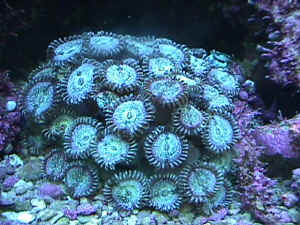
|
| Unknown critter 5/8/06 Hello all
<Howdy Kent>
This
is my first attempt at a marine aquarium, and all is going well so
far. Running a 90 litre tank with a couple of ocellaris,
live rock and soon hoping to get some coral. <Some?>
This brings me to the point. I have attached
a picture I took in my aquarium of some sort of polyp (my best
guess) and am hoping it will be ok with corals. <Is a
zoanthid... should get along here> I welcome any
assistance you can give me. There are probably dozens of
pics of this on the net but I have not been able to find
them. The live rock it came on apparently came from up
by Cairns, in Australia. <Been there... fabulous town, gorgeous
uphill outback... Wish the upcoming int'l. HHH was going to be
there instead of Perth> I did try feeding it a small
brine shrimp, and it pulled it into the
center. Incidentally it is about ? an inch tall.
Thank
you in advance, Kent <Please read here: http://wetwebmedia.com/zoanthid.htm and the linked
files above. Bob Fenner> |
|

|
Coral ID, Zoanthids - 04/17/2006 Happy Holidays Crew,
<And to you Homer.> I have a rock that a friend gave me as he
was getting rid of his saltwater tank. The rock has some kind of
coral that I am having a hard time IDing. <Ok...there's the
pic.> Any help would be greatly appreciated. I have attached a
photo. <These are Zoanthids Homer. Hmm...correction, these are
grumpy Zoanthids. With time and care these should open right up.
Start here for more info. http://www.wetwebmedia.com/zoanthid.htm .> Thank
you
Homer J.
<Oh.. uh..ungh...must resist ;) - Josh> |
|

|
| Coral... zoanthid ... double-posted two-fer 04/17/2006
Happy Holidays Crew, I have a rock that a friend gave me as he was
getting rid of his saltwater tank. The rock has some kind of coral
that I am having a hard time IDing. Any help would be greatly
appreciated. I have attached a photo. Thank you Homer j <Looks
like some sort of Zoanthid to me. Perhaps an Isaurus sp. Bob
Fenner> |
Yucky Zoanthus? 12/26/05 Hi Crew, <Hi Lisa.>
You have a great site, its been a big help lately but I
just cant seem to find out what this is. <I'll see
what I can do to help you out.> It looks like a zoanthid but I
haven't seen any polyps extract <Extend?> from it.
This coral is not of my own but I do have the opportunity
to buy it. It seems to have a lot of mucus on it as
well. a few people have said it looks like a very irritated
zoo and the mucus might by why the polyps wont come out. <Almost
impossible to say anything or advise without a photo. However if they
are Zoanthus they do not sound like they are in very good shape at all.
Zoanthus are quite hardy and should open even in marginal lighting and
sub-par water conditions. The mucus sounds like some sort of
fungal or bacterial infection, even a parasite possibly.> Any help
would be grateful. <Sorry I could not be of more
help.> Marry Christmas and Happy New
Year <To you as well Lisa, be safe.> Lisa <Adam J.>
Invertebrate ID - Zoanthids 6/20/05 First of all,
I want to join in with the masses and thank you for the wonderful and
informative website. <Thanks kindly!> It has been my
number one reference for researching my re-entry into marine
fishkeeping. I recently purchased a bunch of used equipment
to set up my corner 55 gallon tank, in which I plan on keeping some
peaceful fishes (a Banggai cardinal, a Jawfish, a shrimp
goby w/ shrimp-friend, a sand- sifting goby, and a couple of neon
gobies). Any advice on a good order to introduce them?
<All are peaceful enough... although I doubt that you have enough
sand depth for the Jawfish (6"/15cm bare minimum... double that is
better). Plus... they do poorly in mixed species tanks. A species tank
would be much better here. And perhaps add the goby last as they can be
a bit territorial> Although my tank is newly established with a 4+
inch DSB with sugar- fine aragonite sand, much of the live rock came
from a well-established aquarium. Although I scrubbed much
of the long algae off before I set up the tank, there was still lots of
pink, purple, and red coralline algae on the rocks, along with a base
of green fuzzy algae. Within a week of running in the tank,
these polyp creatures showed up on a piece of live rock, along with
many tiny featherduster worms all over the tank. I see two
separate species of polyps, one of which has a dark, purplish center
(mouth/anus) <... one in the same for some people I know...> and
a ring of many randomly ordered tentacles with very fine green lines
pointing to the center. It is about 15mm around, there is
only one of him, and I swear he moved about 1 1/2" across the rock
one night. The others, of which there are many,
varying in size from a couple of millimeters to one centimeter, have a
white center and a neat row of mini green tentacles with no lines
pointing to the center. At first I though I might of had a
flower pot coral, then I thought they might be
zooanthids. <yes... they appear to be the latter:
colonial anemones, so-called "button polyps." A Zoanthid>
If my description and barely adequate picture can help you identify
these new friends for me, I would be very grateful. I
didn't plan on adding any cnidarians until I had a better
handle on my water quality and more experience, but the miracle of
the reef has blessed me with an early surprise. I just want
to identify and not kill these guys. <No worries... they are very
durable as you can now attest to> Thanks in advance, Joel Schwartz
<Best regards, Anthony>
| Cnidarian Organism ID - 5/28/2003 Hello
Crew People: <cheers, my friend> Hey, I have this round thing
that started to grow on my LR. I like to catch things
early in case of a potential problem. <agreed... and
if it is desirable, to nurture it ASAP> Any idea what it is, or
where I can look for it? Is it like a polyp or something
good? Thanks, Rich. <does appear to be a small
Zoantharian button polyp. A welcome find if so. Do send
another/clearer pic as/if it gets bigger. Seems harmless at any
rate. Best regards, Anthony> |
|
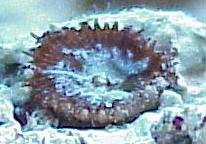
|
| Strange polyp growth Hello Crew! <JediRay> I have
a polyp colony that is doing great since coming out
of QT. It originally only
covered about 1/2 of a rock and now coats
nearly the entire thing!
They start out a whitish-brown and then turn to a
bright green when the polyps
mature. The last month or so, there have been
these strange growths at the end of the rock (the
side the polyps expanded to). I
originally thought they were polyps but they show no
sign of opening up. Any ideas to what
they are? Attached is a pic of
them. I have searched and searched and found
nothing that looks like what these
are. Feel free to post it if you know
what they are. Thanks <A zoanthid of some
sort. Looks like a Protopalythoa species to me. Bob Fenner> |
|
Pic on comp. 1 that's on the fritz (not zyme).
TBA later
|
Elegant Moon Polyp I purchased some live rock and
had a polyp type thing on it. I haven't successfully
gotten a good pic of it yet, but it doesn't have any long tentacles
on it. I looked at the "live aquaria" website
under polyp coral and it really looks like an elegant moon
polyp. My question is, there is only one of these
"button" looking things, is this possible or is it something
else? << Well it is possible. Without seeing a picture
I don't think any of us can really help you out. The
main items to watch are to see if it has a hard skeleton, does the
polyps ever retract all the way, and a general color may help. For now,
I would just let it keep growing and wait six months. After
that time it may be large enough to photograph and identify. >>
Thanks and love your site! << Thanks, we love your questions.
>> Donna << Adam
Blundell >>
|
Algae or coral ?? These just appeared on live rock from
a crevice after having it for four months. They are like a bubble
but not sphere shaped, flat on top. The bottom is reddish-purple
with small tan spots and transparent. The top is cream color with
dark spots. There were two at first but now seem to be growing
more small ones from base. Have looked at all kinds of pics and
never saw these. I'm attaching a picture and I hope it helps.
Algae or coral?? This rock was covered with Aiptasia
anemones and reading on your cite helped rid my 90 gal. tank of
them. they were spreading all over. I got two peppermint shrimp
and they ate all of them. large and small...I wish I had a before
pic. They were gone when I got to borrow a camera.
Thank
you.
<Actually... looks like a zoanthid to me. Please see
here: http://www.wetwebmedia.com/zoanthid.htm
Bob Fenner>
Jim
|
|
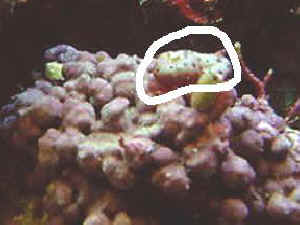
|
Zoanthid ID 6/7/03 Hey Guys, <Howdy>
I bought 45Lbs of live rock about 8 months ago and noticed this
little guy starting to grow. It seems to be doing pretty well
considering my lighting in my take is minimal(2X40 watt bulbs 1
power glow and 1 actinic blue) I suppose its some type of coral but
not sure what. <it is actually a zoanthid: AKA "Button
Polyp"> I know the pictures aren't great but it was
hard to get the camera focused. Any Ideas? <yep... bring the
subject closer to the front of the glass for a sharper focus and
shorter field of depth <G>> Best Regards, Jason Hester
Mobile, Alabama
<best regards, Anthony> |
|
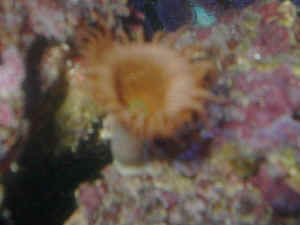
|
| Protopalythoa toxica? 11/17/03
Hello WetWeb, I recently acquired a star polyp that I believe is a
Protopalythoa Toxica. A photo is attached. <alas... we cannot ID
to species reliably by photograph... but similar/same agreed> I
purchased this at a LFS and was told it was from Hawaii. The polyps
were not attached to any kind of rock and was told rock cannot be
removed from Hawaii. <correct, I believe... but the do get
shipped occasionally. Wish it weren't so> I have placed it
in substrate. Lighting is PC 220 watts (110 watts at 10,000 and 110
Actinic) on a 55 Gal. tank. <heavy blue light indeed... great
for LPS and some softies., corallimorphs> This tank is about
17" tall. The LFS told me they feed theirs frozen Mysis
shrimp. Mine does not seem to want Mysis. What else do they eat?
<they will eat small/tiny minces meats of marine origin...
mysids are good. Yours may simply need more time to acclimate. Feed
zooplankton substitutes> Next question: A few of the polyp heads
have changed from a gray green mottle to having yellow in them. Is
this normal? <yes... variable color and adaptations to the
change in lighting> Not sure you can tell from the picture. I
have been reading Anthony's book and realize they are poisonous
and will heed warnings. John <heehee... true my friend... and
the species name underscores it all <G>. best regards,
Anthony> |
|

|
Re: Protopalythoa toxica 11/18/03 Anthony, Thanks for the
quick response. Will these attach to LR? <yes... in time they will
easily> As stated I have them placed in substrate. Should I attach
to LR using maybe fishing line? <personally preferences... they will
grow and spread across rock or rubble just the same> I had them
placed on LR at first without attaching. Turns out my clown fish
didn't like it there and kept knocking it off the rock. <my
guess is a maroon clownfish? They are notorious for this <G>>
I am enjoying your book. Very informative. Keep up the good
work! John <ahh... thanks kindly for your interest/support! Best of
luck :) Anthony>
Zoanthids in Japan Dear Mr. Fenner, Hello - my name is
Jamie Reimer and I am a Canadian graduate student at Kagoshima
University studying Zoanthids in southern Kyushu, Japan. I have been
working with a Zoanthid species for 2 years now, and I am still having
problems identifying it down to the species. I picked up your e-mail
address from the wetwebmedia.com site as I was trying (unsuccessfully)
to ID my species. Anyways, I wanted to ask if you or anyone you know
could point me in the right direction as to IDing this species.... as
you can imagine, access to English books over here is a bit limited...
Thanks for your time, sincerely, Jamie Reimer <Will send your query
along to the ever-so astute stony coral (though I know that these are
not of that Order...) taxonomists Douglas Fenner and J. Veron for their
in turn referring you to up-to-date help. Am surprised that you have
not (or don't mention) finding current researchers names,
whereabouts that might be able to help you through a literature
search... Do you have BIOSIS, Zoological Abstracts online there? Hmm,
be chatting. Bob Fenner>
Mysterious life forms Hello, I was hoping you could help
identify a couple of mysteries in my 72 gal reef tank. <I'll
try> The first came with a piece of green Alcyonium leather coral
that got through FFExpress. On the small piece of rock that the coral
is attached to there are two identical creatures that live side by
side. They both have a whitish colored 'stalk' about the
diameter of a string bean and is about 1/2" long. On top of the
stalk is a brownish colored slightly concave disk about the size of a
dime, or maybe just a bit smaller. The edge of the disk is lined with
tiny hair like projections that radiate straight out and are about 1/2
mm long. These creatures are both basically resting against the soft
coral, and don't' react to much. <A zoanthid of some sort
probably> The other is a mysterious set of brown tentacles that
appears now and then from a small piece of live rock. The tentacles are
dark brown, about 1/4" long or maybe a little more and taper to
fine tips. Is this the dreaded Aiptasia?? <Maybe... but if stays in
own place w/o reproducing out of control, not so dreaded/ful> Any
ideas what these two things could be, and should I remove them?
<I'd ignore both for now> Thank you in advance. <Be
chatting. Bob Fenner>
Question?, Coral ID Can you please identify
this piece for me? I add calcium, iodine, strontium and molybdenum,
and Phytoplex to the system through out the week. Does this piece
require any thing else? <possibly doesn't eat much or
any phytoplankton. Zooplankton is much better for most coral. Phyto
for clams, gorgonians and some Neptheids in gross terms> Does it
need low, medium or high lighting. <it is a Zoantharian
(zoanthid). Likely moderate to high light and feeding by absorption
supplementally but little organismal feeding (Protopalythoa
relatives are heavier feeders organismally).> Thanks
<best regards, Anthony Calfo> |
|
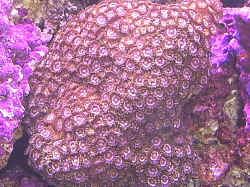
|
Zoanthids? Hi guys, I have a quick identification question.
We went and bought some polyps this weekend that look like giant button
polyp zoanthids that are a brown and white marble sort of color. They
are very large and we were told at the LFS that we bought them at that
they are called cinnamon polyps. <I know them very well. I
poisoned myself three times in ten years as a coral farmer with them.
They are potentially fatally toxic, but know that many corals are that
you don't know about. Besides not eating your corals <smile>,
you often hear that one should wear gloves in the aquarium to protect
your corals from contamination on your hands and to protect your of
course from these stinging animals. This is a good reason. Just do not
handle them with cuts on your hands or propagate them without wearing
gloves <G>. The worst that you are likely to encounter is a
metallic taste in the mouth if you work in the tank without gloves. The
creature is also known as the Giant Sun Polyp, Protopalythoa grandis. A
beautiful creature that also occurs marbled with pink and green! as
well as with radiating red and white stripes.> We have not been able
to find anything on Wet Web that looks like them or on the rest of the
internet, probably because we have the wrong name for them. If you
could please maybe give me an idea of what these giant polyps
are. <yep...Giant Sun Polyps <G>. Always use the name
(Proto)palythoa grandis or P. toxica (Pacific)> Thanks for any info.
you can give. Marci = ) <best regards... and hear is a fascinating
article on the toxin in such Zoantharians:
Red Stick Polyps... Hi... <howdy!> I've pored over
the WetWebMedia site and haven't found the answer to this question,
so I was hoping you could help. The LFS has a livestock I haven't
seen before (a rather rare occurrence for me). It's a long, hollow
tube about 0.5 inches in diameter, maybe 6 inches long. The tube has
many of what look like pink polyps (or red), although they are rather
tall (maybe 0.5-0.75 inches long each); they are all along the tube,
all around it (maybe 50 crammed into this small area). <yep...
an aposymbiotic zoanthid symbiotic with the tube/sponge upon which it
rests> The store says they are actually a form of anemone, and I
suppose they could be, <eh... sort of. The are commonly called
"colonial anemones"> but they apparently don't
propagate off of the base tube. <separate creatures but
dependant upon each other> For placement, they mount it on a
chopstick, which they stick into the rocks and have it hang into the
middle of the tank. <it makes little difference how they mount
them... they will starve to death within months like most. The advent
of refugium strategies and the culture of natural nanoplankton someday
will help us to keep this filter-feeder. Till then... save a life and
don't buy it (spare the re-ordering of another by your sale, that
is)> It's rather pretty, and the LFS calls it "reef
safe". <and "reef starving" too in aquaria>
I'm curious what it actually is, and if you have any experience
with it. Thanks a ton...:) Arthur <a beautiful creature that needs a
species specific tank and possibly live plankton drips (daily) to
survive. Not for any mixed reef aquarium likely. Very difficult to
keep. Best regards, Anthony>
Yellow polyp picture to identify Hi again,
<Hi> here is a pic of my yellow polyps I stole off the
internet. Can you please tell me what type they are and what they
need? <First of all, it's important to point out that no one
has identified the "yellow polyps" we get in the trade. I
can say, however, that most likely it's in the genus
Parazoanthus. Because no one is collecting azooxanthellate
specimens from the Baltic Sea or Mediterranean, these specimens
contain zooxanthellae and will get nutrients through lighting.
These polyps, as you can tell, also contain long tentacles. The
more carnivorous corals will have longer tentacles to ensure a
better ability for food capture. With that said, meaty foods such
as brine shrimp (anything small enough to fit into the oral disk)
will benefit the coral. Overall, these polyps are extremely hardy
and will do quite well in a variety of conditions. > Thank
you,
<Take Care, Graham.>
Pamela |
|

|
Aiptasia? 3/3/04 Hello, We came
back from vacation yesterday and found this guy growing in our
tank. I think it is Aiptasia and I want to get rid of
it; but my wife thinks it may be some type of
mushroom. Could you please positively ID this for
me? I have attached a picture; please let me know if it
is clear enough. Thanks in advance! Dave
<Hi Dave. The critter in your picture is a
Protopalythoa sp. They are desirable soft corals
<<Mmm, actually a zoanthid... not a soft coral... one of my
pet peeves, sorry. RMF>>
, often called "button polyps", definitely not
Aiptasia. Nothing at all to be worried
about. Best Regards. Adam> |
|
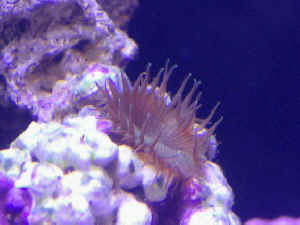
|
|
|

